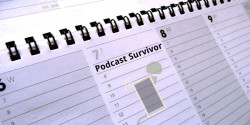I would be remiss if I did not mention yesterday’s debut of Wolfpop, the new popular culture podcast network from Earwolf that is curated by actor/comedian/podcaster Paul Scheer. I also must point out that I work for Earwolf/Wolfpop parent company Midroll Media, and specifically worked on the promotional campaign.
That said, I do think it’s notable that the network launched with thirteen shows, nine of which are brand new productions, featuring some impressive hosts like film critic Leonard Maltin, author and journalist Susan Orlean and comedian W. Kamau Bell, all of whom are new to podcasting. You can read more about it in articles at the Wall Street Journal, LA Magazine and Splitsider. Also, Scheer discusses the launch with Earwolf Podcast Developer Matt Gourley and Midroll CEO Adam Sachs on the new episode of the Wolf Den podcast.
A Year of Podcast Survivor: More than Surviving, Thriving
These days pretty much every week there’s a few more “podcasting is back/profitable” stories. (In fact, it’s getting to the point that I’m not sure I need to write about every one as often as I did even six months ago.)
Although many podcasting veterans chafe at them–arguing, correctly,that podcasting never went away–on balance I think these stories are good. I’m convinced that the attention paid to new efforts like This American Life’s Serial and Alex Blumberg’s Startup bring in new listeners who, after they finish one or two hours of these shows each week will be on the lookout for more great podcasts to fill their queue.
I have to admit it’s a dramatic change from just one year ago when I inaugurated Podcast Survivor as a weekly feature. In that first post I wrapped up a number of then-recent articles about podcasting’s re-entry into mainstream consciousness. I closed by arguing, “This sort of reporting and documenting is critical if podcasting is going to mature as a medium.” Even I didn’t expect that much growth and maturation in just twelve months.
I’ve been a fan of podcasting since I had to use a dedicated “pod catcher” app on my Windows XP PC (iTunes support was still a year or two away) to download shows, which I then transferred to my minidisc player (!) to take on my commute. Those were definitely the early adopter days, when you wither had to be utterly dedicated to some particular shows, or otherwise entranced–like I was–by the prospect of taking on-demand radio shows on the go.
For reasons I can’t explain, I didn’t really start writing about podcasting here until about two years into Radio Survivor’s life, even though I had been a regular consumer since the first feeds hit the web in 2004. But choosing to write regularly about any subject really forces you to think about it critically and put it in perspective, in part just to be sure that it’s worth the effort. So March 2011 really marks the time when my interest in podcasting as a unique medium was once again piqued.
The more I researched and considered podcasting, I became convinced that it has a key role to play in the future of radio. It’s not the case that I ever doubted it, or forgot about podcasting. More mundanely, I took podcasting for granted.
That’s why I don’t scoff at the rising tide of news articles about podcasting’s renaissance nor growing profitability. I agree with the premise that podcasting never went away, but I completely understand the perception that somehow it did. Compared to today, even in 2011 podcasts were more of a pain to listen to anywhere but on a computer. For most people listening to podcasts away from their desks meant downloading shows by old fashioned USB cable to their MP3 player or smartphone–one step too many for a lot of folks.
Today, iOS has a native app and there’s a variety of iOS and Android apps that let you subscribe and listen to shows without ever touching a computer. Listening to podcasts has become more like using Facebook or YouTube, which certainly makes them seem a lot more like they’re back.
Whether or not we use the word “renaissance,” there’s no denying that podcasting is stronger than it has ever been before. It is a growing business where an increasing number of producers and hosts are making money and making a living. It’s a parallel medium to public broadcasting where thousands of supporters are willing to donate hundreds of thousands of dollars to keep their favorite shows in production.
At the same time it’s still a medium that is simple and inexpensive enough to master that there is no end to the opportunities for new producers with fresh ideas, but no radio background–like the Welcome to Nightvale crew–to develop passionate, loyal and large audiences.
One year ago I never would have thought that something as simple as staring a weekly feature on podcasting would have been as much of a fun adventure as it turned out to be. I mean, [I ended up working in podcasting[(https://www.radiosurvivor.com/2014/02/19/podcast-survivor-this-weeks-podcasting-news–2/) because I write about it every week.
I am grateful for my luck that writing Podcast Survivor coincided with a real revival in interest along with an influx of talent and funding.
I’m so looking forward to this next year.



